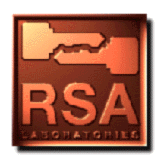

The Rabin signature scheme [Rab79] is a variant of the RSA signature scheme (see Question 8). It has the advantage over RSA that finding the private key and forgery are both provably as hard as factoring. Verification is faster than signing, as with RSA signatures. In Rabin's scheme, the public key is an integer n where n = pq, and p and q are prime numbers which form the private key. The message to be signed must have a square root mod n; otherwise, it has to be modified slightly. Only about 1/4 of all possible messages have square roots mod n.
Signature: s = m1/2 mod n where s is the signature
Verification: m = s2 mod n
The signature is easy to compute if the prime factors of n are known, but probably difficult otherwise - anyone who can forge the signature can also factor n. The provable security has the side-effect that the prime factors can be recovered under a chosen message attack. This attack can be countered by padding a given message with random bits or by modifying the message randomly, at the loss of provable security. (See [GMR86] for a discussion of a way to get around the paradox between provable security and resistance to chosen message attacks.)